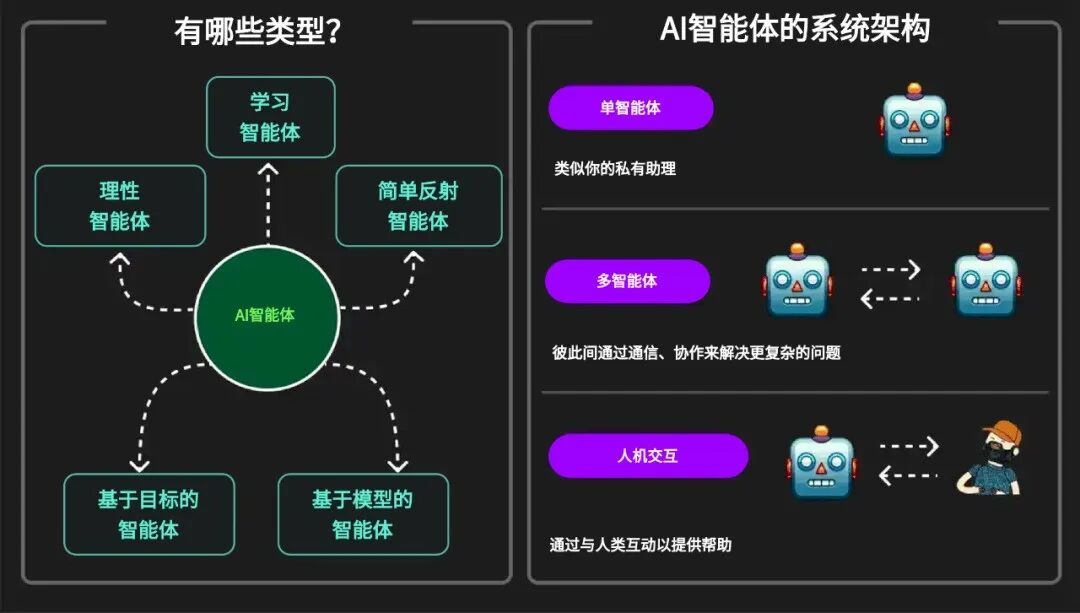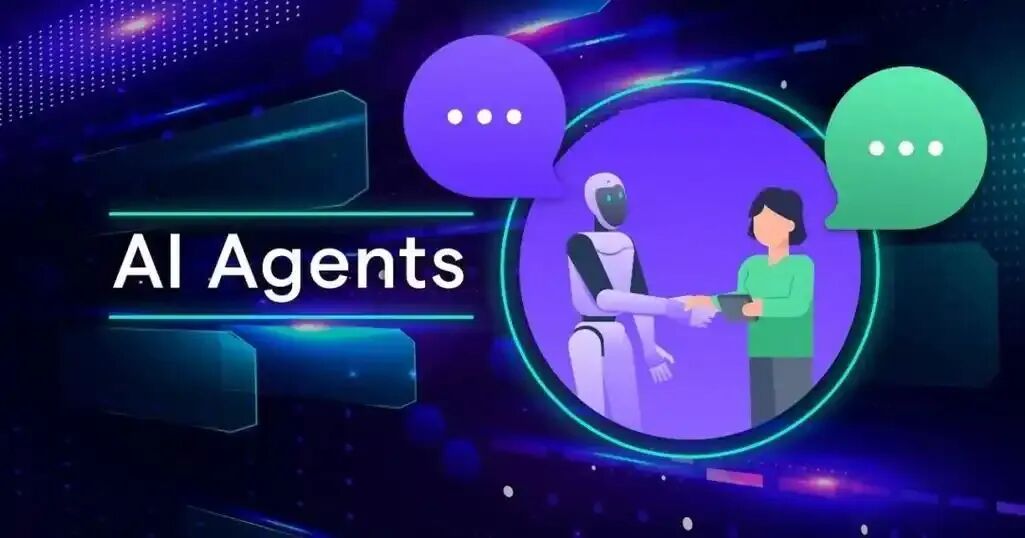AI Agent – AI agents are quietly entering our daily lives. From smart voice assistants to autonomous vehicles and intelligent recommendation systems, AI agents are changing the way we work and live.
█ What is an AI Agent?
An AI Agent is an intelligent system capable of perceiving the environment, understanding tasks, making decisions, and executing actions with minimal human intervention. Most current agents are based on large language models (LLMs), which can integrate external tools and environmental interfaces to perform complex tasks.
To facilitate understanding, you can think of an agent as a “super intelligent assistant.” It not only keenly “observes” the surrounding environment but also engages in deep “understanding” and “thinking,” ultimately completing target tasks independently. More vividly, it is like a professional who can autonomously analyze situations, devise thorough plans, and ultimately deliver satisfactory results.。
 Types of AI Agents and System Architecture Diagram
Types of AI Agents and System Architecture Diagram
How does it work?
The workflow of an AI Agent includes four key steps:
Perception: This is the first step where the agent “observes” the world. AI perceives the surrounding world through external devices such as sensors, cameras, and microphones. For example, if you say, “I don’t feel well,” this statement can be captured by the microphone.Information Processing: After obtaining raw information, the agent needs to analyze it in depth,using a large language model as its “brain,” combined with a memory system and knowledge base,to understand the user’s intentions and needs,extracting valuable data and patterns.Execution and Output:Based on the analysis and understanding of the information, the agent needs to formulate an action plan, call various tools and APIs, execute specific tasks, and provide feedback to the user in an appropriate manner (such as text, voice, etc.).█ Characteristics of AI AgentsAI agents are like super smart assistants that can automatically complete tasks and make optimal choices based on the situation. They have the following characteristics:Autonomous Action: They can complete tasks on their own without constant human supervision. Of course, they can also be controlled by humans at any time without fear of losing control.Super Memory: They can remember your preferences, providing a personalized experience, and can store knowledge, acting like a mobile “knowledge base.”Perception and Processing: They can perceive information from the surrounding environment and process it quickly, almost as if they have superpowers.Tool Usage: They can search for information online, use code interpreters, and call various APIs, making them “tool experts.”Team Collaboration: They can not only collaborate with other agents but also work alongside humans to complete tasks efficiently!█ Application Scenarios of AI Agents
The application scenarios for agents are very broad, covering almost all areas from personal life to business operations. Unlike past intelligent assistants,agents demonstrate greater autonomy and problem-solving capabilities in these scenarios. Here are some typical application scenarios:
Personal Assistant: In personal life, agents can serve as virtual assistants, but they are not just following commands. For example, an agent can autonomously learn your schedule and preferences, proactively remind you of important meetings, and even automatically search for and recommend alternative flights when a flight is delayed, completing the rebooking process without you having to provide step-by-step instructions.
Customer Service:They can not only automatically answer common questions but also autonomously troubleshoot complex issues by understanding customer emotions and historical records, and even handle complaints or refunds directly within their authority, rather than just providing preset answers or transferring to human customer service.
Office Automation:In daily work, agents can help employees automate tedious tasks such as data analysis, document organization, content creation, and report generation. More importantly, they can autonomously identify potential risks or opportunities based on changes in operational data and propose improvement plans to optimize workflows, rather than just executing pre-set tasks.
Healthcare:Agents can assist doctors in diagnosis, analyze medical images, and provide personalized treatment plans. Furthermore, they can act as “smart health partners” in telemedicine, actively monitoring patients’ health data, issuing timely alerts when abnormalities are detected, and even contacting medical professionals in emergencies.
Education:They can be used to create teaching cases and experimental projects, helping students better understand the principles and applications of agent systems, enhancing students’ practical skills and innovative thinking.Autonomous Driving and Robotics:Agents play a core role in autonomous vehicles and service robots. They perceive complex environments, make real-time decisions and plans, and autonomously execute driving or service tasks, far exceeding the traditional notion of an “assistant” function. As AI technology continues to develop, AI Agents are becoming an indispensable part of our lives. They not only enhance work efficiency but also bring unprecedented innovation opportunities to various industries. As an important infrastructure in the field of artificial intelligence,The Hebei Artificial Intelligence Computing Center is committed to promoting the popularization and application of AI technology, providing strong computing power support and innovative platforms for the development of agents. In the future, as more AI Agents are applied, our lives will become smarter, more convenient, and more efficient.
As AI technology continues to develop, AI Agents are becoming an indispensable part of our lives. They not only enhance work efficiency but also bring unprecedented innovation opportunities to various industries. As an important infrastructure in the field of artificial intelligence,The Hebei Artificial Intelligence Computing Center is committed to promoting the popularization and application of AI technology, providing strong computing power support and innovative platforms for the development of agents. In the future, as more AI Agents are applied, our lives will become smarter, more convenient, and more efficient.